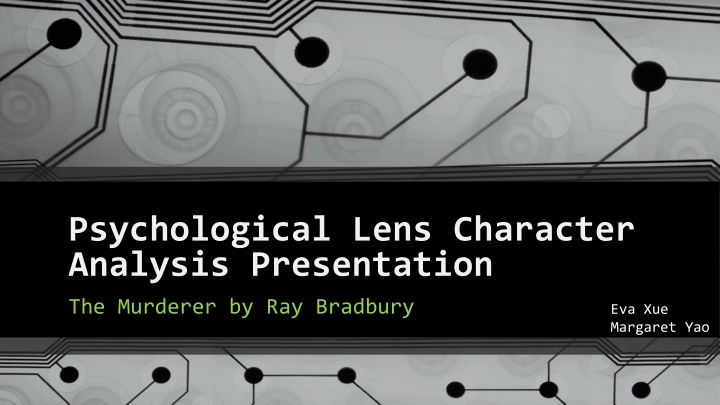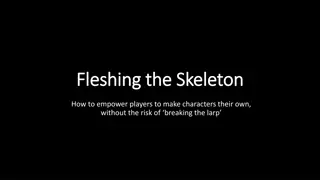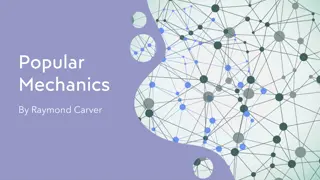
Character Analysis of "The Murderer" by Ray Bradbury Through a Psychological Lens
Explore the complex character of Mr. Brock in Ray Bradbury's "The Murderer" through the id, ego, and superego lenses, showcasing his extreme reactions to technology and his inner psychological conflicts. Dive deep into his motivations, behaviors, and the impact of his actions on the futuristic society.
Download Presentation

Please find below an Image/Link to download the presentation.
The content on the website is provided AS IS for your information and personal use only. It may not be sold, licensed, or shared on other websites without obtaining consent from the author. If you encounter any issues during the download, it is possible that the publisher has removed the file from their server.
You are allowed to download the files provided on this website for personal or commercial use, subject to the condition that they are used lawfully. All files are the property of their respective owners.
The content on the website is provided AS IS for your information and personal use only. It may not be sold, licensed, or shared on other websites without obtaining consent from the author.
E N D
Presentation Transcript
Psychological Lens Character Analysis Presentation The Murderer by Ray Bradbury Eva Xue Margaret Yao
There has been a heated discussion about technology overuse.
Character Introduction In the short story The Murderer by Ray Bradbury, is set in a stage the future in which everyone is heavily surrounded by technology products. Mr. Brock is arrested for destroying electronic products due to his extreme dislike of electronic products. He therefore needs to have an interview with a psychiatrist. In the story, the major character Mr. Brock s id, ego, and superego are being demonstrated through his character development.
Character Analysis Mr. Brock He is a person with a strong sense of personal responsibility. He says that My name will go down in history! (Bradbury 4) as he is getting famous for destroying the technologies. He believes that his actions can change the world to be independent without technology. Mr. Brock has been so sick of noises coming from the radio while he is in the cell, so he just destroys it in order to have a silent place to stay. The psychiatrist thinks Mr. Brock seems completely disoriented, but convivial (Bradbury 5) about what he has done.
Id Mr. Brock has shown his tendency toward vandalism caused by his extreme hatred of the existence of the technologies which represent his id. When he first meets with the psychiatrist, he fully expresses his violent side of himself. Mr. Brock moved quietly and quickly to detach the wrist radio from the doctor's arm. He tucked it in his teeth like a walnut, gritted, heard it crack, handed it back to the appalled psychiatrist as if he had done them both a favor (Bradbury 1). Mr. Brock s behavior shows his inability to control his resistance to technology, so he instinctively wants to get rid of technology. During the interview with the psychiatrist, he asks why Mr. Brock used ice cream to destroy the radio transmitter and Mr. Brock replies that Well, that silence was like putting ice cream in my ears. The feeling of that flannel with my ears. I felt drunk with Freedom!" (Bradbury 3). It can be seen that while being destructive, he still follows his own preferences to what to destroy in order to get the silence that he wants. Therefore, the extreme behaviors and emotions have clearly displayed the id of Mr. Brock towards the technologies.
Ego Mr. Brock also illustrates ego at the same time, which means that he is not a crazy person, and he has a clear understanding of his behaviors. The psychiatrist has commented Mr. Brock to be violent when he damages the radio while he is in prison. However, Mr. Brock claims that he is being violent only to machines that yak-yak-yak."(Bradbury 1). Therefore, Mr. Brock is not a lunatic that has lost his sense and attack people. He simply hates technology products. Before he became extreme, he had participated in fraternities and protests about anti-technology. However, most people still love the radio, which drives him to an extent to which he quits being peaceful. Despite his efforts to resist technologies, he finds that year after year [he] protested. Everyone laughed. (Bradbury 3) This gives the readers an idea that Mr. Brock did try to bring up the awareness of people to stop relying too much on technology in a sensible and peaceful way. In conclusion, Mr. Brock has an ego as he knows what he is doing, and he is trying to get away from the factors that impact him in a negative way from the outside environment.
SuperEgo Mr. Brock's motivation to destroy technology products is not blind and malicious, which is an example of his superego. When the psychiatrist asks about the reason that Mr. Brock the first time becomes sick of the telephone, he answers that an Uncle of [him] called it the Ghost Machine. Voices without bodies. (Bradbury 2) The education of Mr. Brock's family reflects the negative impact of technology on social alienation, and also drives Mr. Brock's determination to eliminate this "impersonal enemy". (Bradbury 2) At the end of the story, when the psychiatrist asks if he regrets his destructive behavior, Mr. Brock is optimistic that one day people will get rid of their heavy dependence on technologies, although it takes. His optimism is demonstrated in his claims in the television that But mark my words, the seed has been sown. I got world-wide coverage on TV, radio, films; there's an irony for you. (Bradbury 4) Ironically, society is still immersed in technology, unable to extricate itself, and he is the only one who is bravely fighting against the society. As a result, there is always a midpoint between id and ego, the superego being the one that represents Mr. Brock has no spiteful purpose of damaging the technologies.
Character Profile Mr. Brock is a dynamic character as the process of his dislike towards the technologies is increasing and the actions he makes are also getting serious. The id, ego, and superego that Mr. Brock displayed show how people can change over time. Id has shown the violent side of Mr. Brock and causes him to do some actions that are incomprehensible for people who love technology and commercials. Ego then proves that Mr. Brock has tried to protest against the technologies in a peaceful way. The superego shows that Mr. Brock does not have malicious motivation.






















